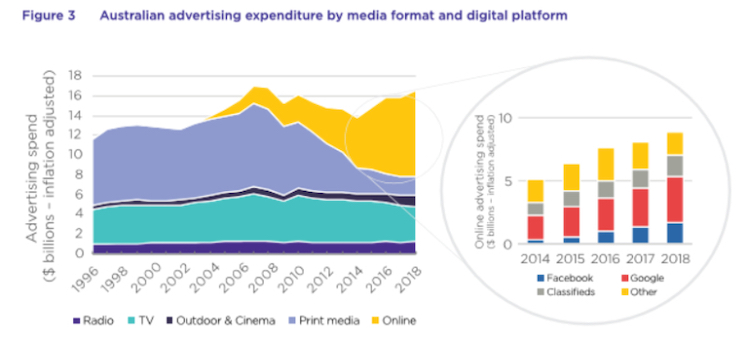Australia’s consumer watchdog, the ACCC, has finally released its long-awaited final report on the market power of Facebook and Google. Long on rhetoric (all 623 pages of it) and short on recommendations, it’s unlikely to dent the massive market power of these search and social media behemoths. Kim Wingerei reports.
According to the ACCC’s Digital Platform Inquiry Report, Google and Facebook occupy more than 50 per cent of the time Australians spend online. Between them, they collect $5.2 billion — almost a third of all advertising revenue in Australia. Their growth from virtually zero in just 15 years is almost entirely at the expense of print media. In 2003, print media advertising was worth $8 billion. In 2018, it was worth around $2 billion (inflation adjusted) — a loss of $6 billion.

This shift of revenue has led to the decline in profits and reduced the number of journalists employed by print media by 20 per cent from 2014 to 2018. It is also one of the reasons Murdoch’s News Limited’s influence is on the wane, not that there’s anything wrong with that.
But if the mainstream media had hoped the ACCC would address their plight with sweeping reforms, they’ve been disappointed. Of the 23 recommendations, only a handful relates to how online news delivery impacts on news dissemination.
Recommendation 9 states that “Stable and adequate (sic) funding should be provided to the ABC and SBS in recognition of their role in addressing the risk of under-provision of public interest journalism that generates broad benefits to society.”
Recommendation 10 suggests public funding via the “Regional and Small Publishers Jobs and Innovation Package” should be from $20 million to $50 million per year. Commendable – but together with recommendation 11, which suggests changed “tax settings to encourage philanthropic support for journalism”, and 12 and 13, “Improving digital media literacy in the community and in schools” – these suggestions are unlikely to make any measurable difference to the imbalances depicted in the report.
Recommendation 6, however, is self-evident being a decade overdue. It refers to the “process to implement a harmonised media regulatory framework”. Much of the regulatory framework for content publication and distribution is already in place but YouTube (owned by Google) and Facebook, Netflix, etc. should be subject to same rules and regulations as broadcast television.
The use of the Internet as the distribution mechanism instead of television spectrum or cable is merely a technicality. We shouldn’t need to reinvent the regulatory wheel every time technology changes. This doesn’t just apply to video content. Podcasts are just unscheduled radio, online publications are just print without ink. We already have copyright laws, privacy regulations, defamation laws and ombudsmen that deal with many of these issues the ACCC report raises. It is time we took a holistic approach.
That said, digital platforms do represent many unique challenges due to the complexity, speed and sheer magnitude of content they distribute. Reuters 2019 Digital News Report states that 33 per cent of news consumers access it primarily via social media, 57 per cent use search engines or news aggregators such as Google News. Only 30 per cent go direct to news websites.
As the ACCC report points out, Facebook, Google and the other social media giants don’t see themselves as publishers, so don’t take responsibility for the content passing through their platforms. Hence, the proliferation of “fake news”, and – as demonstrated by the Cambridge Analytica scandal – surgically-targeted news distribution deliberately aimed at influencing public opinion, particularly elections.
Facebook’s Libra: a public good or a Swiss-based financial system too big to fail?
The ACCC acknowledges this is a global issue and cannot be regulated in isolation in Australia. I would argue that this is an abrogation of its responsibility. Fake news has been around since humankind invented religious dogma, but the intersection of opinion peddlers and the break-down of privacy by the advent of “big data” is now a threat to democracy. The ACCC should not be afraid to pave the way.
We should start with amending broadcasting and publishing regulation to include digital distributors, including licensing of video content in ways that make Facebook, Google (YouTube) and others responsible for their content, just as ABC, Channel Nine, SBS and others are.
Similarly, the digital giants should be made responsible for content on their platform, especially content that breaks Australian laws. Self regulation, codes of conduct, more regulatory bodies and a regime of other reactive measures are a poor substitute.
The ACCC report alludes to stronger data privacy and giving control back to the consumers, much in the same way as the EU General Data Protection Regulation does. But these measures merely address the symptoms of the problem, not the causes.
The truth is is that we, as consumers, have done a deal with the devil — gorging on all this free and wonderful content in return for giving up our privacy.
Why not demand that Facebook et al establish an impenetrable wall between the data that identifies us and the meta-data that profiles our behaviour? The former belongs to us and is not for sale. The latter is a commodity but should have a price and be an opt-in, not an opt-out, as is the case today.
Facebook and Google and their lesser brethren are not – as some will have it – essentially evil or instruments of oppression. But they are immensely rich and powerful and must be held to account. Licensing and privacy regulations as outlined will come at a cost but can be paid from money earned by advertising and selling our data. I would rather see them spend billions of dollars to protect our consumer rights, than paying massive fines that benefit nobody other than lawyers — and the state, national or international body that collects them.
As was evident in the 2016 US Presidential election, it is democracy that is under threat.
Treasurer, Josh Fydenberg, said that the Federal Government will respond to the ACCC report at the end of this year, after a consultation period.
In the wake of the Australian Competition and Consumer Commission recommendations to better regulate the big networks, a new poll from the @Guardian finds a majority of Aussies want the big tech firms to be regulated: https://t.co/qEBprWCMnM
— First Draft (@firstdraftnews) August 8, 2019
———————-
How did the ‘clever country’ end up with a $90 billion botched NBN?
Public support is vital so this website can continue to fund investigations and publish stories which speak truth to power. Please subscribe for the free newsletter, share stories on social media and, if you can afford it, tip in $5 a month.
Kim Wingerei is a businessman turned writer and commentator. He is passionate about free speech, human rights, democracy and the politics of change. Originally from Norway, Kim has lived in Australia for 30 years. Author of ‘Why Democracy is Broken – A Blueprint for Change’.

